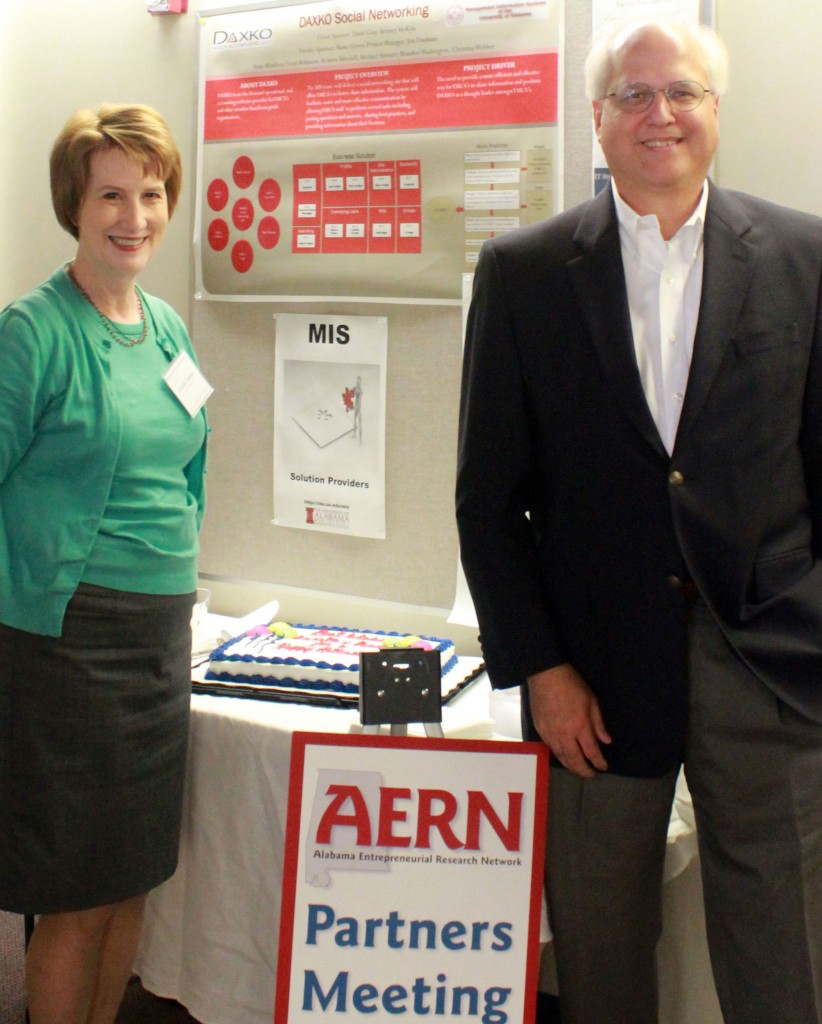AERN Annual Meeting: Farewell to Annette Watters and Paavo Hanninen, Who are Retiring

By Kirsten J. Barnes
CCBP Graduate Assistant
Editor’s Note: AERN is a long-time CCBP partner, cooperating in such matters as communication, research and seed fund operation. Annette Watters has been an active member of the CCBP Council since it was formed in 2008.
The 2012 Alabama Entrepreneurial Research Network partners met on May 22 for a day-long meeting providing partners from the 17 counties an opportunity to learn about new resources, two new centers, and to say farewell to co-directors Paavo Hanninen and Annette Watters, who retired during the service year. The meeting was held at the AIME Building on the campus of The University of Alabama.
During the morning the partners learned about ways they can develop websites for their local sites, as well as ways they can help other businesses in their area learn about developing websites.
"I thought that it was great, especially the segment about the Website that Reata (Strickland) did," said Selma-Dallas County Chamber of Commerce Director Sheryl Smedley, who has worked with AERN for the past three years. "That's what I struggle with because I don't have the money to build a website and get someone who can keep my site up the way it needs to be."
AERN Outreach Coordinator Mary Patterson selected the website training because it was something that members had requested more information about.

"At our workshops, we usually have a round-table discussion and some of the members said that they need more information about websites and marketing on the Internet," said Patterson, who will be coordinating the program until a new director is named.
During the presentation, UA Graphic Designer and Multimedia Artist Reata Strickland explained to the group low-cost ways in which they could develop, host and update their websites, enabling them to expand their reach.
"Seventy-eight percent of North Americans are Internet users," Strickland said. "So, if you need to know why you need to be online, that's the reason. It's an essential tool for small businesses."
Because most of the AERN satellite locations are housed in local Chambers of Commerce, the information provided to the partners can be redistributed throughout 18 counties and potentially impact thousands of business owners.
"I really more than anything enjoyed the demonstration on how to create your own website," said Jenn-Tate, director of the Demopolis Area Chamber of Commerce. "I could do so much more at the chamber with a website."
After lunch, Watters gave a presentation on the specialized services offered by AERN to its clients, including county-by-county economic breakdowns by industry.
"More than 700 different industry reports are available," Watters said.
In addition, to her presentation, Watters announced that there will be two new partners added to 18 existing counties of: Bibb, Butler, Chambers, Choctaw, Dallas, Fayette, Greene, Macon, Marengo, Marion, Monroe, Perry, Pickens, Sumter, Tallapoosa, Washington and Wilcox.
"We have a grant that will enable Lamar and Hale counties to come in," Watters said. "I'm glad to be leaving, knowing that this has been accomplished."
One of the emphasis at the University of Alabama is to engage more community members though research conducted by students, faculty and staff members.
AERN is operated through the College of Business Administration and Dean Michael Hardin believes AERN is a great example of engaged scholarship.
Hardin said too often universities conduct "parachute" experiments where the come in, conduct research and leave.
"This is really what community engagement research is. This could serve as a model," Hardin said, praising Hanninen and Watters for their tireless efforts. "It has a great impact on the community. We come in and make the lives of the people in the community better."
AERN provides entrepreneurial tools and training to 18 rural counties, working in partnership with local agencies to provide entrepreneurs with research and business planning resources.
Each partner agency is provided a toolkit of resources to encourage and assist potential and existing local entrepreneurs. The package of resources includes business reference materials, business planning software, and computer technology.
Financial support for AERN has been provided by the Alabama State Legislature, University of Alabama Provost's Office, U.S. Small Business Administration, Delta Regional Authority, Appalachian Regional Authority, as well as in-kind contributions from our local partners.
Watters and Hanninen are credited with building AERN to its current national recognition as one of the best examples of engaged scholarship in rural America. They have been the co-directors since the program began in 2001 with four counties. An article about the program by Watters, Hanninen and C&BA Dean Mike Hardin appears in the Journal of Community Engagement and Scholarship, Vol. 4, No. 2. Members at the annual meeting were given a copy of the journal containing the article, entitled "Developing a Community-Based Research Network for Interdisciplinary Science: The Alabama Entrepreneurial Research Network."